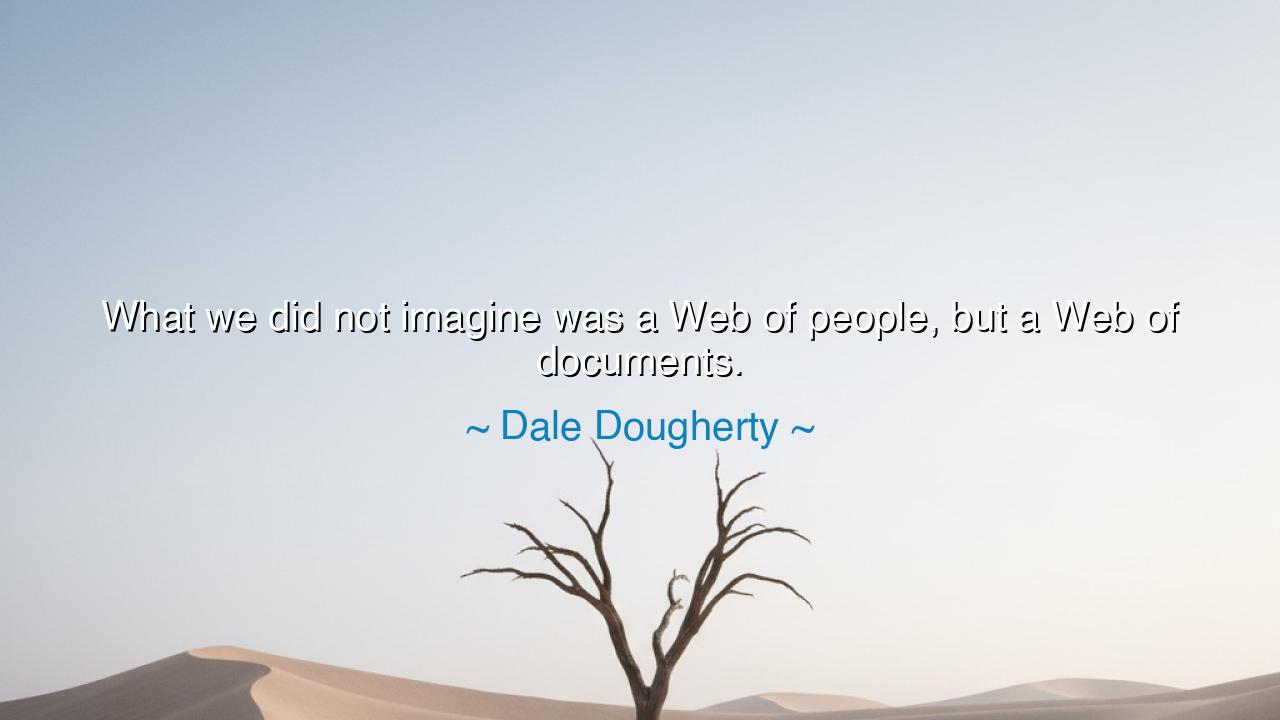
What we did not imagine was a Web of people, but a Web of






What we did not imagine was a Web of people, but a Web of documents. These words, spoken by Dale Dougherty, carry within them a profound insight into the nature of the digital world we now navigate. In the early days of the Internet, pioneers envisioned a vast, interconnected network—one that would link individuals, bridging distances and uniting the world's peoples in a virtual community. They saw it as a platform for communication, collaboration, and a new form of human interaction. But, as Dougherty wisely points out, what emerged instead was something altogether different. The Web we created was not one of people bound by conversation and shared experience, but one of documents, of static pages and fragmented information scattered across a vast digital landscape.
This observation reveals a truth about the nature of technology: it often evolves in unexpected ways. When the first sparks of the Internet were ignited, visionaries like Tim Berners-Lee crafted the World Wide Web with the hope that it would bring the world together in a way never before imagined. Yet as the Web grew, its role shifted. It became a library of knowledge, a repository of documents—articles, videos, images, and all manner of digital files. The human connections we had hoped for were often subsumed by the sheer volume of information. Websites became silos of content, each offering a piece of the puzzle but seldom engaging in true dialogue or interaction.
Dougherty's statement reflects a fundamental shift in our digital experience. The Internet, in its infancy, was a tool for information sharing, a platform for individuals to exchange ideas. But over time, it became a vast collection of documents and resources, far more concerned with storing and disseminating knowledge than facilitating genuine human interaction. The dream of a Web of people—a space for collaboration, emotional connection, and communal engagement—often felt lost amidst the growing mountain of data and information. The human element, while not absent, became secondary to the overwhelming weight of content.
Yet, in this shift, there is a lesson for us. Just as the printing press revolutionized knowledge by making it more accessible to the masses, the digital age did the same. But instead of ushering in an era of deeper, more meaningful human connection, it gave birth to a world where information is abundant, but true understanding can often seem elusive. The Web of documents offers knowledge, but it does not offer wisdom. It connects us to facts, but not always to each other.
In the same way that the Industrial Revolution transformed the landscape of human labor, the rise of the digital era has reshaped how we interact with the world. Early industrialists did not foresee the way machines would change the human spirit, nor did those who birthed the Internet fully anticipate how it would alter our relationships. The Web of people may have been the ideal, but the Web of documents became the reality. And so, we find ourselves navigating a world of knowledge, often without the deeper connection that we once hoped for.
In the course of our lives, we must ask ourselves how we can bridge the gap between these two visions. How can we turn the Web of documents into a Web of people? The answer lies within us. It is through conscious intention that we can reclaim the human element in our digital lives. The lesson is clear: While the Web may offer endless streams of information, true connection—the Web of people—must be cultivated with care. It is not enough to consume knowledge passively; we must engage with it actively, fostering relationships, exchanging ideas, and seeking not just facts but understanding.
As you walk through this digital age, remember that it is within your power to forge connections in the midst of all the information that surrounds you. Use the tools at your disposal—not just to share documents, but to build bridges between minds and hearts. The Web of documents may be vast, but it is the Web of people that will endure. Make that your legacy.






AAdministratorAdministrator
Welcome, honored guests. Please leave a comment, we will respond soon